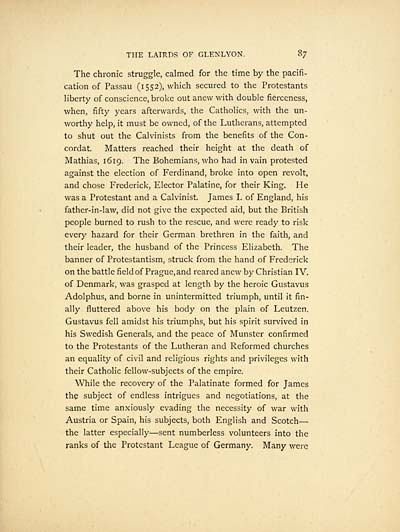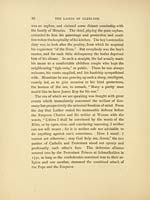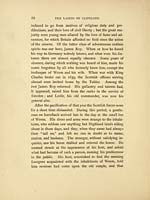Lairds of Glenlyon
(99) Page 87
Download files
Complete book:
Individual page:
Thumbnail gallery: Grid view | List view

THE LAIRDS OF GLENLYON. 87
The chronic struggle, calmed for the time by the pacifi-
cation of Passau (1552), which secured to the Protestants
liberty of conscience, broke out anew with double fierceness,
when, fifty years afterwards, the Catholics, with the un-
worthy help, it must be owned, of the Lutherans, attempted
to shut out the Calvinists from the benefits of the Con-
cordat. Matters reached their height at the death of
Mathias, 1619. The Bohemians, who had in vain protested
against the election of Ferdinand, broke into open revolt,
and chose Frederick, Elector Palatine, for their King. He
was a Protestant and a Calvinist. James I. of England, his
father-in-law, did not give the expected aid, but the British
people burned to rush to the rescue, and were ready to risk
every hazard for their German brethren in the faith, and
their leader, the husband of the Princess Elizabeth. The
banner of Protestantism, struck from the hand of Frederick
on the battle field of Prague, and reared anew by Christian IV.
of Denmark, was grasped at length by the heroic Gustavus
Adolphus, and borne in unintermitted triumph, until it fin-
ally fluttered above his body on the plain of Leutzen.
Gustavus fell amidst his triumphs, but his spirit survived in
his Swedish Generals, and the peace of Munster confirmed
to the Protestants of the Lutheran and Reformed churches
an equality of civil and religious rights and privileges with
their Catholic fellow-subjects of the empire.
While the recovery of the Palatinate formed for James
the subject of endless intrigues and negotiations, at the
same time anxiously evading the necessity of war with
Austria or Spain, his subjects, both English and Scotch —
the latter especially — sent numberless volunteers into the
ranks of the Protestant League of Germany. Many were
The chronic struggle, calmed for the time by the pacifi-
cation of Passau (1552), which secured to the Protestants
liberty of conscience, broke out anew with double fierceness,
when, fifty years afterwards, the Catholics, with the un-
worthy help, it must be owned, of the Lutherans, attempted
to shut out the Calvinists from the benefits of the Con-
cordat. Matters reached their height at the death of
Mathias, 1619. The Bohemians, who had in vain protested
against the election of Ferdinand, broke into open revolt,
and chose Frederick, Elector Palatine, for their King. He
was a Protestant and a Calvinist. James I. of England, his
father-in-law, did not give the expected aid, but the British
people burned to rush to the rescue, and were ready to risk
every hazard for their German brethren in the faith, and
their leader, the husband of the Princess Elizabeth. The
banner of Protestantism, struck from the hand of Frederick
on the battle field of Prague, and reared anew by Christian IV.
of Denmark, was grasped at length by the heroic Gustavus
Adolphus, and borne in unintermitted triumph, until it fin-
ally fluttered above his body on the plain of Leutzen.
Gustavus fell amidst his triumphs, but his spirit survived in
his Swedish Generals, and the peace of Munster confirmed
to the Protestants of the Lutheran and Reformed churches
an equality of civil and religious rights and privileges with
their Catholic fellow-subjects of the empire.
While the recovery of the Palatinate formed for James
the subject of endless intrigues and negotiations, at the
same time anxiously evading the necessity of war with
Austria or Spain, his subjects, both English and Scotch —
the latter especially — sent numberless volunteers into the
ranks of the Protestant League of Germany. Many were
Set display mode to:
![]() Universal Viewer |
Universal Viewer | ![]() Mirador |
Large image | Transcription
Mirador |
Large image | Transcription
Images and transcriptions on this page, including medium image downloads, may be used under the Creative Commons Attribution 4.0 International Licence unless otherwise stated. ![]()
| Histories of Scottish families > Lairds of Glenlyon > (99) Page 87 |
|---|
| Permanent URL | https://digital.nls.uk/95356087 |
|---|
| Description | A selection of almost 400 printed items relating to the history of Scottish families, mostly dating from the 19th and early 20th centuries. Includes memoirs, genealogies and clan histories, with a few produced by emigrant families. The earliest family history goes back to AD 916. |
|---|

